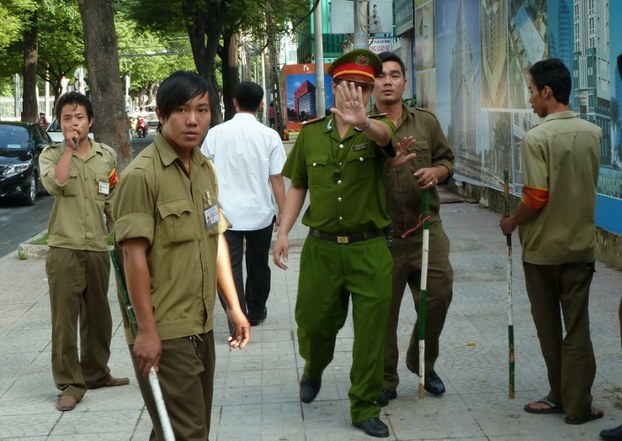




Vietnam’s revised rules on police investigations to take effect next week are a move in the right direction but are not sufficient to prevent abuse of power, a rights group and activists say.
U.S.-based Human Rights Watch said the new policy governing probes carried out by the police, known as Circular 28, is an improvement over past rules, but falls well short of the deep reforms needed to curb “widespread police abuses” in the one-party communist
“If the Vietnamese government is serious about ending police abuses, Circular 28 could provide a good start,” Phil Robertson, deputy Asia director of Human Rights Watch, said in a report.
“But no one should assume that progress can be made unless top levels of the government are wholly committed to ensuring effective police reform.”
Human Rights Watch pointed out that the new rules require further improvements and clarifications of some problematic areas.
For instance, the Ministry of Public Security must specify that each officer’s responsibility before his superiors does not take precedence over his responsibility before the law.
The group also criticized the new policy for emphasizing the role of the commune police, considered the least professional of the country’s police force with the fewest resources and minimal training to handle investigations. The commune police are also known to beat suspects in custody.
Vietnamese police have come under fire in the local media for abuse of suspects, some of whom have died in custody, raising concerns that the abuses are systemic.
In March, a 39-year-old man in the Central Highlands was allegedly beaten to death by local police who were interrogating him for supposedly stealing pepper.
“Local newspapers have reported many similar deaths—some occurring at police stations during interrogations and some after being released—prompting calls for better guarantees of the rights of the accused and for more police transparency,” the state-run Thanh Nien newspaper said when commenting on the case.
Lawyer Nguyen Van Hau, deputy chairman of the Ho Chi Minh City Jurists’ Association, said violations during interrogation could be easily avoided if investigating agencies strictly respected the right of those arrested to seek the services of a lawyer, the newspaper said.
The Criminal Procedures Code stipulates the participation of a defense lawyer at the beginning of investigations except for crimes that can affect national secrets or national security, he said.
Human Rights Watch said the new rules use language that presumes criminality before an individual is found guilty of a crime and limits the role of defense lawyers.
One article in particular says lawyers and their assistants can be subject to disciplinary measures for activities that hinder or “cause difficulties to investigation work,” and the new rules appear to encourage investigators to collect evidence proving that others have caused difficulties to their work.
“These provisions on legal counsel give too much power to police investigators to arbitrarily decide which defense activities are appropriate and which should be punished,” the Human Rights Watch statement said.
Bloggers have their say
Activist bloggers in Vietnam reacted with skepticism about the new rules on police investigations.
Blogger Trinh Kim Tien said the new rules were a good sign, citing what she felt was widespread police torture.
But she said they failed to specify punishments for officers who violated Circular 28’s provisions.
“It is just like an empty promise that the police always give,” she said.
Another activist blogger, Anna Huyen Trang, said if Vietnam had respected the United Nation’s Convention against Torture, which the country signed in Nov. 2013, the government would not have had to issue the new rules.
“If they respected the convention, there should not be any case where a healthy person died after being interrogated at the police station,” she said.
When asked whether the circular would help reduce the number of detainee deaths at police stations, another blogger, Thuy Nga, was doubtful. She pointed out that whenever someone in police custody was beaten to death, officers usually blamed it on thugs or self-injuries.
“This fact makes me believe that this circular will not reduce the number of deaths at police stations, and there will be more people arrested by plainclothes police,” she said.
Not all bad news
Human Rights Watch acknowledged that Circular 28 supplements and improves certain existing regulations.
For example, it states that the main principle of police investigations is to “comply with the Constitution and laws [and] respect the interests of the State, human rights, and the rights of legitimate interests of offices, organizations and individuals.”
The circular also prohibits police investigators from coercing or planting statements or using physical punishment, requires investigators to be accountable for their actions and decisions, and includes procedures for resolving complaints and accusations of police misconduct and abuse.
“Abuses by Vietnam’s police have grown rampant in recent years because the government has failed to rein in officials who violate rights,” Robertson of Human Rights Watch said.
“If there is political will to seriously enforce them, then these new police regulations could start a process of ensuring police abuses are investigated and prosecuted,” he said.
Reported by Chan Nhu for RFA’s Vietnamese Service. Written in English by Roseanne Gerin.